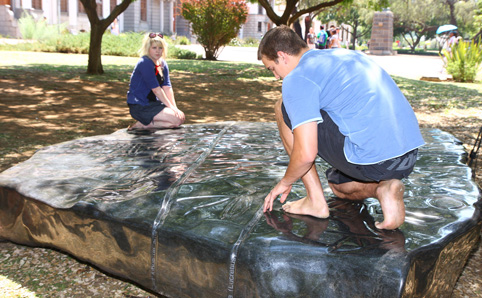Latest News Archive
Please select Category, Year, and then Month to display items
14 June 2024
|
Story Anthony Mthembu
|
Photo Suplied
 Jeremiah Hlahla, a UFS student completing his PhD in Botany at the University of Debrecen as part of an exchange initiative funded by the Erasmus+ Mobility Programme.
Jeremiah Hlahla, a UFS student completing his PhD in Botany at the University of Debrecen as part of an exchange initiative funded by the Erasmus+ Mobility Programme.
As part of an exchange initiative facilitated by the Erasmus+ Mobility Programme, Jeremiah Hlahla, a student at the University of the Free State (UFS), is nearing the completion of his PhD studies at the University of Debrecen in Hungary. Hlahla’s journey, which began in February 2024 and is set to conclude in July 2024, has been a remarkable learning opportunity. “As a first time-traveller to Europe, I have thoroughly enjoyed engaging with people from different countries and cultures,” he said.
The benefits of international collaboration
Hlahla is currently pursuing a PhD in Botany, focusing on plant stress physiology. “My current PhD project investigates the physiological, biochemical and morphological responses of vegetable-type soybean, or edamame, to combined drought and heat stress,’’ he explained. He considers the University of Debrecen the ideal institution to complete his research due to its extensive expertise and resources in similar projects. He noted that his colleagues at Debrecen conduct significant work on plant protection against biotic and abiotic stresses, including salt and drought stress, as well as proteins and amino acids in barley and other legumes.
Given the vast knowledge available on similar projects, Hlahla has found substantial engagement with his work at the University of Debrecen. “Upon arrival, I delivered an introductory lecture presenting my UFS project on the synergistic effects of combined drought and heat stress on the physiology and biochemistry of edamame. It was an engaging session as everyone could relate to my work and asked many questions,’’ he said.
Insights gained from the exchange
Hlahla has also gained valuable lessons that will assist him in his research career, including biotechnology and physiology tools. “I learned how to prepare samples and use high-performance liquid chromatography (HPLC) and reversed-phase ultra-high-performance liquid chromatography (UHPLC) to quantify proteins and amino acids,’’ he said. These techniques are beneficial not only for his current work but will also support future soybean research.
As his experience at the University of Debrecen nears its end, Hlahla reflects on the collaborations and friendships he has formed, which stand out as a significant highlight.
Willem Boshoff’s artwork placed on Bloemfontein Campus
2011-10-21
 |
Students viewing the new artwork on our Bloemfontein Campus
Photo: Hannes Pieterse |
There was great excitement last week when Willem Boshoff’s Thinking Stone sculpture arrived and was installed near our Main Building. The black granite stone, which was quarried at Boschpoort Granite in Belfast, Mpumalanga, weighs approximately 20 tons and took about a year to polish to give it its burnished quality.
On the surface of the stone are engravings that resemble the prehistoric rock engravings of the Driekopseiland rock art site close to Kimberley. Added to the engravings are sandblasted inscriptions in six languages of verses and well-known quotes that refer to the word “rock”.
Willem Boshoff is one of South African’s most established artists and his artworks are deeply involved in relationships and focused on bringing about conversation. Willem describes the Thinking Stone as being “a place for gathering and sharing ideas, as universities should be”. The sculpture is a huge investment for our university and will, for many years to come, inspire thought, dialogue and contemplation.
Willem Boshoff’s sculpture is, to date, the largest of fifteen artworks commissioned by the Sculpture-on-Campus Project and funded by the National Lottery Distribution Trust Fund.